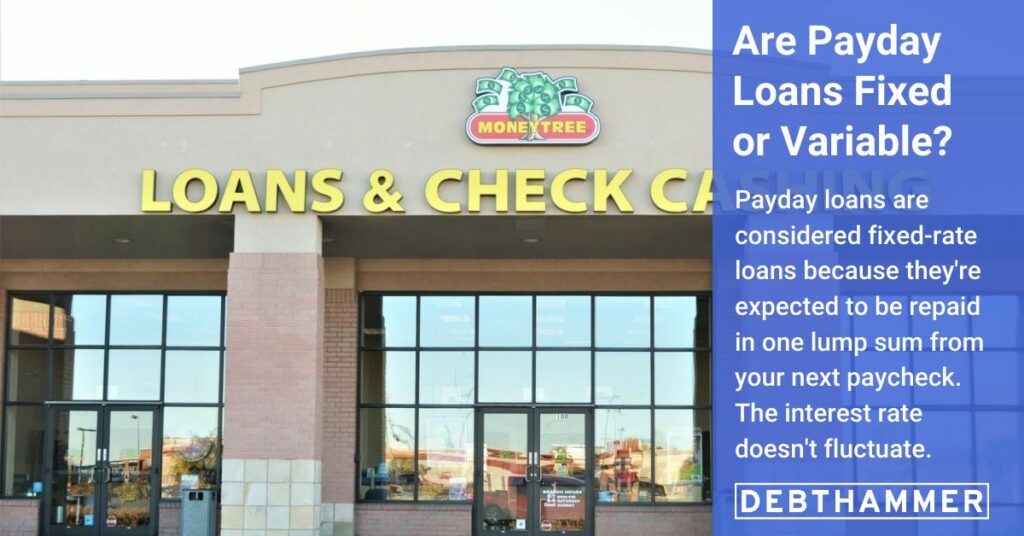Payday loans are a notoriously expensive form of borrowing. However, their interest rates are often unclear. That’s because many payday lenders express their costs as a flat fee instead of an annual percentage rate (APR).
This often leaves confused borrowers wondering whether their payday loan interest rate is fixed or variable.
Table of Contents
Our take
- Payday loans have fixed interest rates
- Payday loan interest rates are usually presented as fees rather than annual percentage rates
- Fixed interest rates don’t change over the life of the loan, which for payday loans is usually two weeks
- Variable interest rates fluctuate over the life of the loan
- There are better fixed-rate loan options available if you need some quick cash
Stuck in payday debt?
DebtHammer may be able to help.
Payday loans are fixed-rate loans
Payday loan interest rates are considered fixed because they’re expected to be repaid in one lump sum from your next paycheck.
“Payday loans are like a one-shot deal,” says Jeff Rose, certified financial planner and founder of GoodFinancialCents.com. “You borrow a certain amount, and the interest rate stays the same. They’re not like your credit card where you can spend, pay, and spend again.”
But payday loan fees and interest rates can be confusing because of how they’re presented to borrowers.
Payday lenders technically don’t charge any interest at all. Instead, they charge fees, usually around $15 for each $100 borrowed. This tricks users into thinking the loans are low-cost when they’re actually extremely expensive. A $15 fee to borrow $100 for 14 days equates to an annual percentage rate of 391%. Make no mistake. These are very high interest rates. The average APR on a credit card is about 20%.
But there are ways to calculate the total cost of your payday loan. The federal Truth in Lending Act requires payday lenders to specify all the finance charges you’ll pay.
READ MORE: Pros and cons of payday loans
Pro tip: Pay close attention to these fees. The Consumer Financial Protection Bureau has issued several warnings about payday loans’ excessive fees and costs. These may include rollover fees, late fees, overdraft and non-sufficient funds (NSF) fees and even fees if you need your loan funds loaded onto a prepaid debit card.
The lender has no legal right to add fees not included in the contract, but some predatory lenders may try to bend that rule.
READ MORE: How will payday loans affect your credit score?
Tribal payday loans also have fixed interest rates
Tribal payday loans are issued by lenders affiliated with Native American tribes. These tribes have what’s known as “sovereign immunity” and can set their own laws. This means that if you live in a state where payday loans are illegal or interest rates are capped, a tribal lender is NOT REQUIRED to follow these laws.
Tribal loans are also fixed-rate loans, but in many cases, they don’t have to be repaid in full on your next payday. However, the interest rates are often in the quadruple digits and compound monthly. The debt can spiral out of control dangerously fast.
Carefully read the fine print on your lender’s website to ensure you are not borrowing from a tribal lender. Those loans cause even more problems for payday loan borrowers than traditional loans.
READ MORE: Tribal payday loans and lenders
Pro tip: It’s important to note that federal laws don’t apply to tribal payday loans. Many borrowers have been tricked into thinking their state’s fixed interest rate cap will apply to their loan and were unpleasantly surprised when they realized they’d repaid more than three times the total amount they borrowed.
READ MORE: Payday loan interest rates
Fixed vs. variable-rate loans: What’s the difference?
There are two types of loan rates:
- Fixed: The interest rate locks at the beginning of the loan with no option to increase or decrease. Examples of fixed-rate loans include car loans, federal student loans, personal loans and fixed-rate mortgages.
- Variable: Depending on various factors, including the Prime Rate established by the Federal Reserve, the interest rate can fluctuate during the repayment term. Variable-rate loans include credit cards and adjustable-rate mortgage loans.
Both fixed and variable interest rates can be risky to the borrower. Still, variable-rate loans are a much bigger gamble because even a slight increase in the interest rate can significantly increase the cost of your loan. Fixed-rate loans can only cause the borrower to miss out on potential savings. Variable-rate loans may cost you a significant amount of money.
READ MORE: Payday loans vs. installment loans — which is better?
Payday loan interest rates are extremely high
Despite fixed interest rates, repaying your loan from your next paycheck isn’t always easy. More than 80% roll over payday loans into a new loan. Failure to repay a payday loan as scheduled will always lead to additional charges. Payday lenders punish borrowers who default with penalties, late charges, and even overdraft fees while attempting to collect. More than 90% of payday loan borrowers regretted their original payday loan.
Payday loans are not affordable. Your best bet is to exhaust all other options before turning to a payday lender. It can take years to escape once you fall into the payday loan debt trap.
READ MORE: Payday loan interest rates
Better payday loan alternatives
Payday lending should only be considered a last resort if you have fair to good credit. You will have plenty of better borrowing options.
- Cash advance apps like Dave
- Debt consolidation loans
- Payday Alternative Loans
- Home equity loans or lines of credit (HELOCs)
- Unsecured personal loans
READ MORE: Practical payday loan alternatives
The bottom line
Payday lenders aren’t always transparent about fee structures or interest rates but are technically fixed-rate loans. However, if you don’t repay the loan in time, the lender can tack on additional fees, increasing the money you pay to borrow.
Are you stuck in the payday loan debt trap?
If you’ve taken out a payday loan and are struggling to pay it back, DebtHammer is here to lend a hand. We specialize in helping people escape the payday loan trap.
Contact us today, and we’ll work together to pay off your payday loans once and for all.


